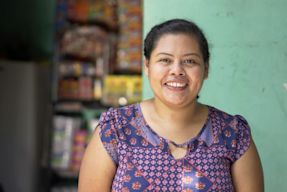No matter where you live on the planet, water means life.
But it’s much harder to get in some places than others. In Ghana, many communities often lack safe, affordable sources for clean drinking water. Such areas also tend to offer few economic opportunities, especially for women.
So much is possible with a little investment. A Kiva loan helped Aisha grow her business and become more independent — all while serving her community with safe water.
“Because I have more business, more profit… it has really helped me a lot, my family and my community. That is all because of Kiva.”
Water security in Ghana

Aisha lives in Dansoman, one of the largest suburbs in Ghana’s Greater Accra Region. The area is known as a center of art and culture and boasts modern infrastructure, and much of the city is supplied with water from the nearby Weija Dam and Water Treatment plant.
However, the plant cannot meet the demand of all of its households, leaving some of its poorest residents to find alternative sources of drinking water. These sources are often unmonitored and untested, so those with no other option also suffer great concerns about their health and well-being.
According to a 2020 study published in The Journal of Environmental Research and Public Health, Ghanaians cite the following worries about the water they buy from unregulated vendors:
Microbial contaminants from unhygienic conditions
High costs that prevent fulfilling household needs
Environmental concerns about single-use plastics
Social enterprise Jibu addresses those concerns by leveraging emergent markets to provide safe drinking water to these communities. Using a four-step, internationally-accredited filtration system to process untreated water, tankfuls are then distributed by local franchisees like Aisha in reusable containers. The business owner is supported by a strong company framework, and communities get a consistent source of clean, affordable water.
At least half of Jibu's business owners are women — quite notable since it operates mainly in countries where gender parity is a distant dream. In their experience, “women-owned franchises on average drive more growth, manage finances better, and are more compliant with Jibu’s franchise system standards.”
Loans to women work
“In Africa, we believe the man has to take care of the wife. But now, I'm like an independent woman, so I have a lot that I can do on my own without asking. Because of that, my home also improved: More peace, more happiness.”
Kiva also believes that women make good business owners — and knows that when women succeed, so do the rest of us. Women tend to spend money on nutrition, education, and other resources that have long-term positive impacts.
Crowdsourced loans from Kiva lenders have helped thousands of women borrowers open grocery stores, run farming operations, and, in Aisha’s case, bring essential drinking water to her neighborhood and beyond. Kiva’s partnership with Jibu helps the company provide credit to its franchisees so that they can finance their business and buy inventory to scale quickly.

From left to right: Jomay (Kiva's Vice President, Marketplace Ops & Chief of Staff) Jonathan (Jibu's Country Director), Shiela (Jibu staff), Aisha, and Michelle (Kiva's Senior Grant Project Manager).
Though she had already signed on as a Jibu franchisee — a business she calls “her soul” — Aisha found herself unable to expand without capital.
She applied for a Kiva loan that enabled her to purchase refillable water bottles from Jibu, which she then sells to her customers to bring back to refill. This not only keeps single-use plastics out of the landfill, it caused her business to boom with demand for delivery and a second location.
“Even setting up this business, I was able to hire a lot of workers. The profit that I'm generating from this business is also supporting me with my family,” she says of her rapid success.
“Because I have more business, more profit… it has really helped me a lot, my family and my community. That is all because of Kiva.”
She says she is now able to travel with her family twice as much as she used to, now that she has a steady source of income.
Taking out a Kiva loan has also had a significant impact on Aisha’s quality of life at home. Though Ghana passed a Gender Equality Law in 2024 that requires women to occupy more places in government and private industries, traditional gender roles still prevail in much of society.
“In Africa, we believe the man has to take care of the wife,” explains the mother, who now spends her days working and overseeing her staff.
“But now, I'm like an independent woman. So I have a lot that I can do on my own without asking. Because of that, my home also improved. More peace, more happiness.”
Bigger goals, a bright future

By becoming an entrepreneur who brings safe, clean drinking water to her neighborhood, Aisha not only earns money, but confidence in herself and her abilities.
It has also shown her that “the woman also can contribute to a lot of things. So Kiva has helped a lot. It's a big bonus.”
She’s not the only one: 86 percent of women borrowers report a boost in confidence after receiving their loan, and 90 percent say they’ve been able to reach their financial goals.
For Aisha, that means it’s time to set new goals. Now that she has two Jibu franchises, she has her sights set on expanding even more—maybe even further than Dansoman itself.
“Meaning taking a whole country for myself,” she says with a smile.
“And I think Kiva will help me with that as well.”















